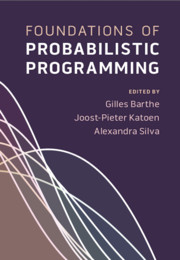
-
Select format
-
- Publisher:
- Cambridge University Press
- Publication date:
- 18 November 2020
- 03 December 2020
- ISBN:
- 9781108770750
- 9781108488518
- Creative Commons:
-
This content is Open Access and distributed under the terms of the Creative Commons Attribution licence CC-BY 4.0.
https://creativecommons.org/creativelicenses - Dimensions:
- (244 x 170 mm)
- Weight & Pages:
- 1.23kg, 582 Pages
- Dimensions:
- Weight & Pages:
Open AccessYou have digital access to this book
Book description
What does a probabilistic program actually compute? How can one formally reason about such probabilistic programs? This valuable guide covers such elementary questions and more. It provides a state-of-the-art overview of the theoretical underpinnings of modern probabilistic programming and their applications in machine learning, security, and other domains, at a level suitable for graduate students and non-experts in the field. In addition, the book treats the connection between probabilistic programs and mathematical logic, security (what is the probability that software leaks confidential information?), and presents three programming languages for different applications: Excel tables, program testing, and approximate computing. This title is also available as Open Access on Cambridge Core.
Reviews
'In our data-rich world, probabilistic programming is what allows programmers to perform statistical inference in a principled way for use in automated decision making. This rapidly growing field, which has emerged at the intersection of machine learning, statistics and programming languages, has the potential to become the driving force behind AI. But probabilistic programs can be counterintuitive and difficult to understand. This edited volume gives a comprehensive overview of the foundations of probabilistic programming, clearly elucidating the basic principles of how to design and reason about probabilistic programs, while at the same time highlighting pertinent applications and existing languages. With its breadth of topic coverage, the book will serve as an important and timely reference for researchers and practitioners.'
Marta Kwiatkowska - University of Oxford
Contents
Full book PDF-
Frontmatter
pp i-iv -
-
- You have access
- Open access
- Export citation
-
-
Contents
pp v-vi -
-
- You have access
- Open access
- Export citation
-
-
List of Contributors
pp vii-x -
-
- You have access
- Open access
- Export citation
-
-
Preface
pp xi-xiv -
-
- You have access
- Open access
- Export citation
-
-
1 - Semantics of Probabilistic Programming: A Gentle Introduction
pp 1-42 -
-
-
- You have access
- Open access
- Export citation
-
-
2 - Probabilistic Programs as Measures
pp 43-74 -
-
-
- You have access
- Open access
- Export citation
-
-
3 - Application ofComputable Distributions to the Semantics of Probabilistic Programs
pp 75-120 -
-
-
- You have access
- Open access
- Export citation
-
-
4 - On Probabilistic λ-Calculi
pp 121-144 -
-
-
- You have access
- Open access
- Export citation
-
-
5 - Probabilistic Couplings from Program Logics
pp 145-184 -
-
-
- You have access
- Open access
- Export citation
-
-
6 - Expected Runtime Analyis by Program Verification
pp 185-220 -
-
-
- You have access
- Open access
- Export citation
-
-
7 - Termination Analysis of Probabilistic Programs with Martingales
pp 221-258 -
-
-
- You have access
- Open access
- Export citation
-
-
9 - The Logical Essentials of Bayesian Reasoning
pp 295-332 -
-
-
- You have access
- Open access
- Export citation
-
-
10 - Quantitative Equational Reasoning
pp 333-360 -
-
-
- You have access
- Open access
- Export citation
-
-
11 - Probabilistic Abstract Interpretation: Sound Inference and Application to Privacy
pp 361-390 -
-
-
- You have access
- Open access
- Export citation
-
-
12 - Quantitative Information Flow with Monads in Haskell
pp 391-448 -
-
-
- You have access
- Open access
- Export citation
-
-
13 - Luck: A Probabilistic Language for Testing
pp 449-488 -
-
-
- You have access
- Open access
- Export citation
-
-
14 - Tabular: Probabilistic Inference from the Spreadsheet
pp 489-532 -
-
-
- You have access
- Open access
- Export citation
-
-
15 - Programming Unreliable Hardware
pp 533-568 -
-
-
- You have access
- Open access
- Export citation
-
Metrics
Altmetric attention score
Full text views
Full text views help Loading metrics...
Loading metrics...
* Views captured on Cambridge Core between #date#. This data will be updated every 24 hours.
Usage data cannot currently be displayed.
Accessibility standard: Unknown
Why this information is here
This section outlines the accessibility features of this content - including support for screen readers, full keyboard navigation and high-contrast display options. This may not be relevant for you.
Accessibility Information
Accessibility compliance for the PDF of this book is currently unknown and may be updated in the future.


